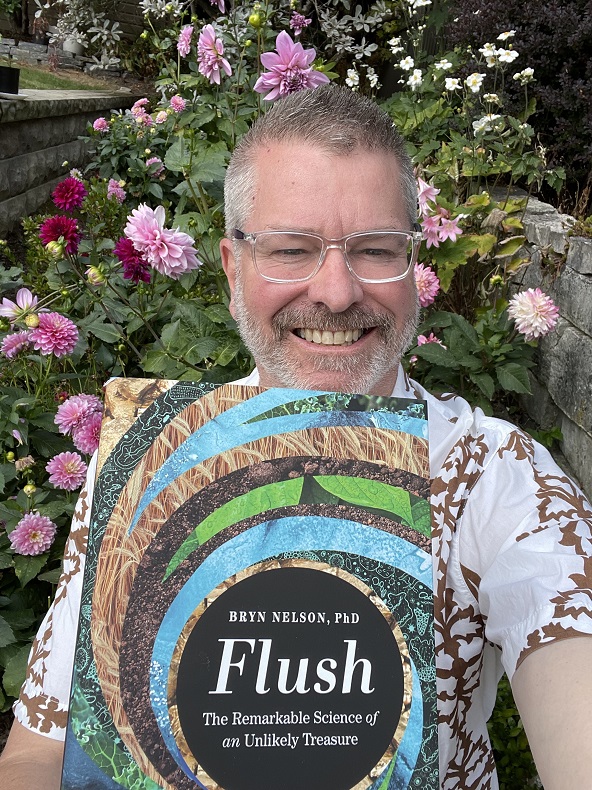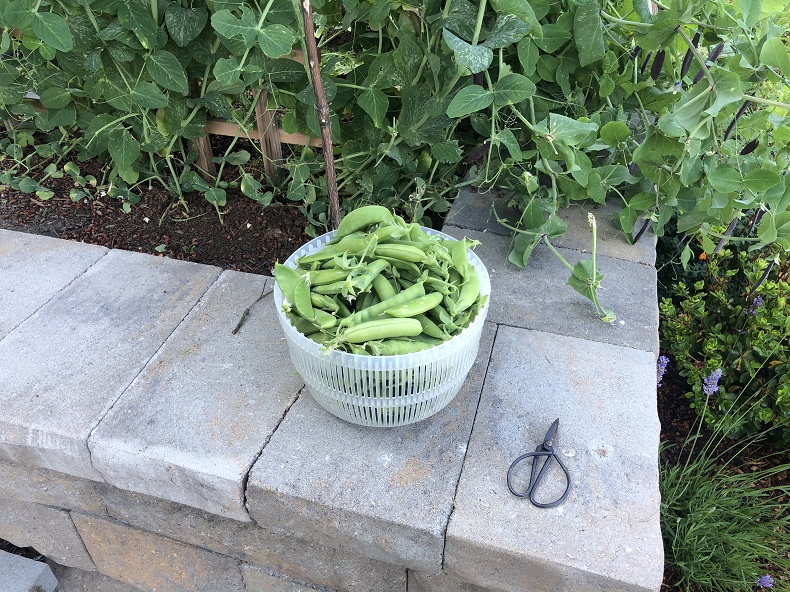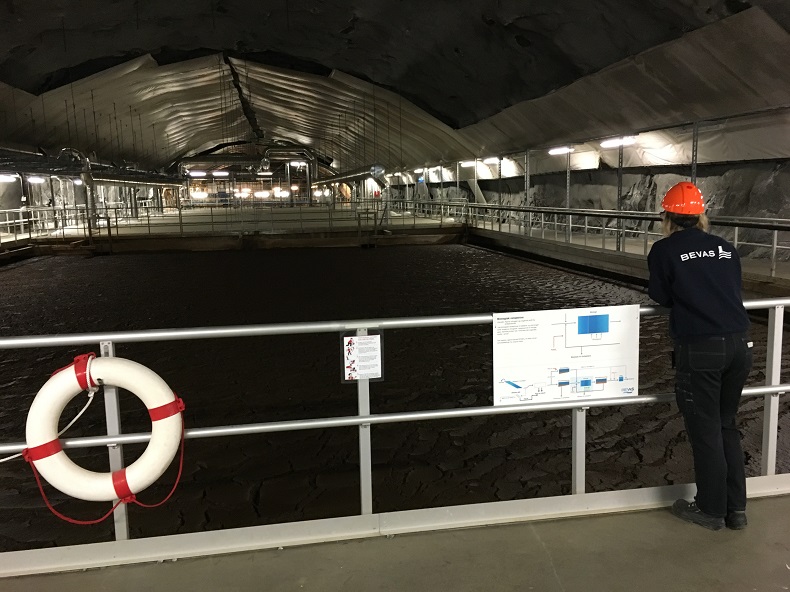
Bryn Nelson is a Seattle-based science writer whose book, Flush: The Remarkable Science of an Unlikely Treasure, came out September 13. Yes, that’s right–it’s a book about poop. So of course, Helen and Cameron wanted to take a deep dive into this important (seriously!) topic. Here’s our conversation with Bryn, which has been lightly edited and improved with additional poop puns.
Helen: Why poop? Why a whole book about poop?
Bryn: Ha, maybe not your typical protagonist? I trained as a microbiologist in graduate school, though, so I was already all about microbes, and it turns out that a good chunk of your poop is made up of living and dead bacteria.
After I wrote a feature about fecal microbiota transplants for the magazine Mosaic, I began to pay more attention to other poop-related stories and studies, and realized how amazing and completely misunderstood it is as a natural resource.
I became kind of obsessed with the idea of writing a book about it as a quirky, but hopefully accessible, way of highlighting our dysfunctional relationships with our own bodies and the rest of nature and how we might rebalance those interactions.
Cameron: I really loved that the book gave an overview of how the GI system works fairly early on (I’d forgotten how a lot of this worked), and then went into detail later about the many ways the gut and the immune system are linked. (It’s pretty amazing that the gut microbiome could even affect brain development in young kids!) Do you think knowing more about how much gut health is tied to overall health will bring more respect (or at least less squeamishness) to poop?
Bryn: I hope so! The connections between the microbiome, health, and development are so fascinating to me – there was so much I didn’t know before starting this project and I think the research will surprise a lot of readers.
Thinking about gut health in ecological terms – like the need for balance – may help people grasp how gut dysbiosis, or an imbalance in the microbial community, can lead to all kinds of radiating harm to other parts of the body. And if we think about poop as basically the growing medium or container for our amazing collection of inner microbes that really do function like an organ, maybe it will earn poop just a bit more respect.
Helen: Did you have to overcome any disgust while you were doing the reporting for this book? Or were you already over it before you started?
Bryn: It’s funny, poop doesn’t disgust me that much – except for maybe stepping in dog poop. I guess I’ve just gotten over it through my career in science and science writing and by having a dog that poops a lot. But I’m pretty disgusted by other things, like beets, cockroaches, dead slugs, runny eggs, and hair in the shower drain.
In my own gardens, I had to get comfortable with using composted biosolids, which are basically a combination of treated poop, bacteria, and other solid organic matter left over after the wastewater treatment process. I decided that I needed to use it myself if I was going to suggest that other people try it. Fortunately, I was able to overcome any hesitancy pretty quickly once I read about the science and testing requirements and then saw and smelled for myself that the compost was very soil-like; my plants loved it, of course, which also helped.

The same thing for drinking recycled water and beer: seeing for myself how thoroughly it was treated, understanding how all water on Earth is recycled, and hearing about the testing made me much more comfortable trying it.
Helen: So when you say “recycled water” I’m guessing you mean…water that used to be pee? Also, I have a follow-up question: Ew?
Bryn: Haha. Yes, exactly! In fact, several researchers have suggested that everything we drink used to be dinosaur pee, among other things. But I think it’s way less gross if you consider that this is how nature works: everything we’re using now will be reused again too – it’s just a matter of whether you can take it all the way back to pure H2O. And we definitely can.
I think beer is an especially clever way to get people past disgust because it makes people really curious and open to hearing about the process of stripping everything down to those water molecules and then adding back minerals to create different brews. Plus, the beer I tried was super tasty!
Cameron: It was so fun to see the connection to (LWON alum) Michelle Nijhuis’ book Beloved Beasts and the importance of bison poop in shaping the prairie. (And also to LWONer Emma Marris’ book Wild Souls. LWON should sponsor you or something!) And you also wrote about how prehistoric poop affected the ecosystem. This made me wonder, are people using poop now to restore habitat?
Bryn: What I love about this is that it’s flipping the notion of poop as an environmental pollutant on its head. Giant animals have dispersed nutrients for millions of years through their dung! If we do it right, we can use the carbon and nutrients in our own regular output to heal degraded or sterile environments, like gravel pits, old mines, and some landscapes contaminated with things like lead and arsenic.
Unlike synthetic fertilizers, which focus mainly on phosphorus, potassium, and nitrogen, recycled biosolids provide a wider array of nutrients – because they’re coming from us – and help nurture the soil. That’s what you want if your goal is to literally help restore an ecosystem from the ground up. Among other applications, recycled biosolids can be applied to fire-scarred forests to help speed the healing, and to degraded prairies to help nurture native plants – especially since the bison population that used to provide that service is only a fraction of what it used to be. And because of their physical properties, clay-like biosolids can lock up some contaminants too and prevent them from being taken up by plants. It’s such a fascinating and underappreciated area of research.
Cameron: Also, I keep writing “poop,” but do you have a preferred poop word? Is poo better? Or crap? Or shit? Can we say shit here?
Bryn: Ha, I hope so! I do use several different words in the book. “Poo” is the preferred word for many British readers, but it’s a bit too cutesy for most of us in the U.S. I don’t use “feces” or “excrement” that often because they seem overly clinical to me. “Biosolids” is fine, but that term is generally tied to the wastewater treatment process and it can contain other things as well.
Some people may think “poop” is too juvenile, but it seems to be what most people use in their conversations, and I wanted this book to be approachable. So poop – and occasionally shit – is my go-to word.
Helen: I find the word “poop” endlessly amusing, but using the word “shit” in this context makes me so uncomfortable! I only use it as an occasional swear, not as an actual reference to feces. Anyway. Enough about me. What is your favorite poop fact? I assume you have a favorite poop fact now.
Bryn: Helen, you’re asking me to choose just one? I’m so fascinated by poop that it’s hard to pick a favorite here. One that comes to mind is related to the fecal transplants used to cure C. diff bacterial infections. Stool banks like OpenBiome collect and distribute the fecal samples used for these treatments, which save lives. Only about 3% of prospective donors pass the screening process – less than the acceptance rate at Harvard! Super donors, who donate several times a week can cure many hundreds of patients every year.
Another fun fact is that dogs have such a keen sense of smell that research suggests they can tell one individual human or animal from another by the distinctive smell of our poop!
Helen: Are you super fun at parties now?
Bryn: I suppose there are limits at dinner parties. But my friends are quite amused by my obsession at the moment.
It’s pretty funny how even people who are initially, “Ewwww! That’s gross!” are then like, “But tell me more!” Maybe that says something about my friends? Ha. Many of them are the kind of people who send me emails or DMs whenever they come across a poop story, with a “Thinking of you” note. Thoughtful, right? I guess I have my own Poop Patrol.
Cameron: I want to go to a party with Bryn! Yes, can you turn everything into a poop joke?
Bryn: Cameron, did you hear about the boy who ate four cans of alphabet soup? He had a very long vowel movement.
OK, OK! But when I try to suppress the puns and jokes, they seem to tumble out anyway. Poop’s funny! If I can make someone laugh and engage them long enough to surprise them and get them to see our natural output in a new light, that’s a win for me.
Helen: What was the most surprising thing you learned while doing the reporting for the book?
Bryn: One of the biggest surprises was how much we still have yet to learn, certainly about what many of the microbes in our microbiome actually do, but even about how the process of digestion works in detail and which chemicals are most responsible for poop’s distinctive eau de toilette. I love that researchers are still fighting over which chemicals are the main constituents of its odor. We’re also still learning about the physical and chemical properties of poop. For example, scientists think its consistency, how it’s sticky like clay, can act like Velcro to bind up metal contaminants. Also, biosolids can actually change the soil structure to retain more water, air, and nutrients. That’s so amazing to me.
Cameron: For someone who reads your book and is super inspired to learn even more about poop –where would you send them? What’s next in the poop world? And what’s next for you?
Bryn: NIH should have a National Institute of Poop! NIP? NIP!

In the meantime, my book includes an extensive bibliography and some specific suggestions for further reading.
One very cool trend in the poop world is that some wastewater treatment facilities are transforming themselves into resource recovery facilities that can reclaim everything from biogas and biosolids to drinking water, phosphorus, and even precious metals–while being carbon neutral! I hope to write more about this.
As to whether I have a book #2 in me (sorry), we’ll have to wait and see.
Holly Shit, what an interesting article!